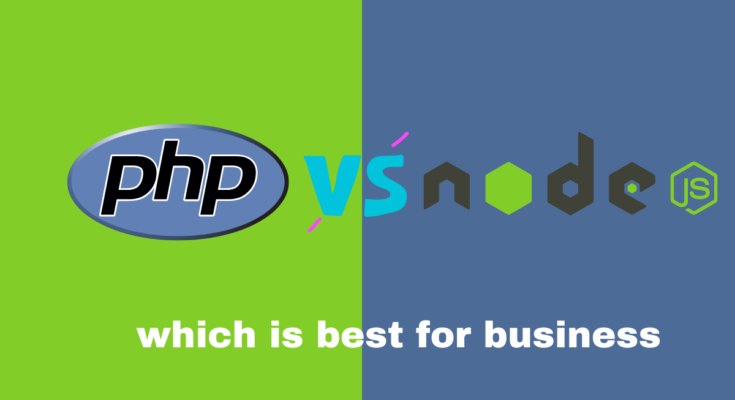As a business owner, you know how important it is to choose the right technology for your business. Finding the ideal solution for your requirements might be difficult with so many alternatives available. In this article, we will compare two popular technologies – PHP vs Node.js – to help you make an informed decision for your business.
What is PHP?
PHP is a programming language that runs on servers and is frequently used for creating websites. It was first released in 1995 and is now one of the most popular programming languages on the web. Since PHP is an open-source language, it is available for free and has a sizable developer community that actively participates in its advancement.
One of the main advantages of PHP is its compatibility with various platforms, including Linux, Windows, and macOS. It is also easy to integrate with databases like MySQL and PostgreSQL, making it an ideal choice for web applications that require database connectivity.
What is Node.js?
A JavaScript runtime environment called Node.js enables programmers to create server-side JavaScript applications. It was first released in 2009 and has gained popularity in recent years due to its ability to handle large-scale, real-time applications.
Because Node.js is based on Google’s V8 JavaScript engine, it is quick and effective. It is also event-driven, which means it can handle multiple requests simultaneously, making it an excellent choice for applications that require real-time data processing.
Differences between PHP and Node.js
Both PHP and Node.js are popular technologies, but they have fundamental differences that set them apart. The following are some significant variations:
Performance Comparison between PHP and Node.js
One of the most significant differences between PHP and Node.js is their performance. PHP is a server-side language that generates HTML, which means it is not as fast as Node.js. Node.js, on the other hand, is built on Google’s V8 engine, which makes it incredibly fast and efficient.
Node.js also has a non-blocking I/O model that allows it to handle multiple requests simultaneously without blocking the main thread. This makes it an excellent choice for applications that require real-time data processing, such as chat applications and social media platforms.
Community Support and Popularity
Another significant difference between PHP and Node.js is their community support and popularity. PHP has been around for more than two decades and has a large community of developers who contribute to its development. This means there are plenty of resources and documentation available for PHP, making it easy to learn and use for web development.
Node.js is a relatively new technology, but it has gained popularity in recent years due to its ability to handle real-time applications. It has a growing community of developers who contribute to its development, and there are plenty of resources available for learning and using Node.js.
Learning Curve and Ease of Use
PHP is a relatively easy language to learn and use, making it an ideal choice for beginner developers. It has a simple syntax and is easy to integrate with databases like MySQL and PostgreSQL. However, PHP can become complex as projects become more extensive, requiring developers to learn more advanced concepts.
Node.js, on the other hand, uses JavaScript, which is a language that many developers are familiar with. This makes it easy to learn and use for developers who are already familiar with JavaScript. However, Node.js can be more challenging for beginner developers who are not familiar with JavaScript.
Security
Security is a critical factor to consider when choosing a technology for your business. Both PHP and Node.js have their security features, but they differ in their approach.
PHP has a built-in security feature called magic quotes, which automatically escapes special characters in user input. It also has several security libraries available that can be used to secure web applications.
Node.js, on the other hand, relies on third-party modules for security, which can be a security risk if not used correctly. However, Node.js has several security modules available that can be used to secure applications.
Scalability
Scalability is another crucial factor to consider when choosing a technology for your business. Both PHP and Node.js are scalable, but they differ in their approach.
PHP is a traditional server-side language that generates HTML. This means it can be challenging to scale PHP applications to handle high-traffic loads. However, there are several tools and techniques available, such as caching and load balancing, that can be used to scale PHP applications.
Node.js, on the other hand, is event-driven, which makes it highly scalable. It can handle multiple requests simultaneously and can be easily scaled horizontally by adding more servers.
Use Cases for PHP and Node.js
PHP and Node.js have different strengths and weaknesses, making them suitable for different use cases. Here are some examples of when to use PHP and Node.js:
Use PHP for:
- Web applications that require database connectivity
- Content management systems (CMS)
- E-commerce websites
- Web applications that require server-side rendering
Use Node.js for:
- Real-time applications like chat applications and social media platforms
- Applications that require real-time data processing
- Microservices
- IoT applications
Choosing the Best Technology for Your Business
Choosing the best technology for your business depends on your specific needs and requirements. If you need a language that is easy to learn and use and is suitable for web applications that require database connectivity, then PHP may be the best choice for you.
If you need a language that can handle real-time applications and can scale horizontally, then Node.js may be the best choice for you. It is also a good choice if you are already familiar with JavaScript.
Conclusion
PHP and Node.js are both popular technologies that offer unique strengths and weaknesses. Choosing the right technology for your business depends on your specific needs and requirements. Hopefully, this guide has helped you make an informed decision about which technology is best for your business.




